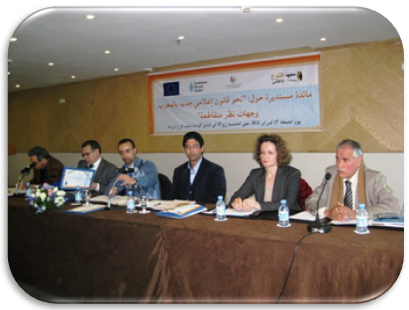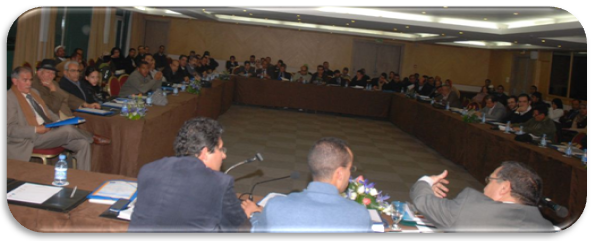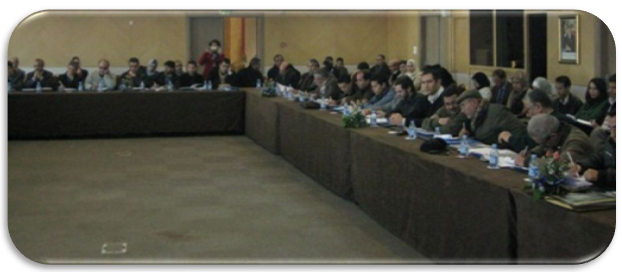 Published: 2 March 2012
Published: 2 March 2012
Region: Morocco
By Safi Naciri, MDI Media Advisor Morocco

“Towards a new media law under the current political climate” was the focus of a roundtable organized by the Media Diversity Institute and the Moroccan Centre for Studies and Research in Human Rights and Media, and supported by the European Union and the Hanns Seidel Foundation on 17 February 2012.
Ali Karimi, a Media Law Professor, started with a historical background up to the present. He drew a picture of the reality of the fourth power or rather working towards forming a fourth power in Morocco.
It all started with the issuance of the Press Law in 1958. Necessarily, the political climate at that time was reflected and the features of the law were of a liberal nature. Soon the trend changed and the circle of restrictions began to reach their peak after the events of March 1973 in Bouknniferh and Moulay Bouazza.
Achieving political settlement which brought Al-Yusufi to the leadership of the interim government, it was a must to reform the bad aspects of the press law introduced during the years of troubles. Such reform has been introduced through 2002 amendments, which according to Karimi, have not been up to the desired level. He considered the current moment a suitable occasion to introduce a broader and deeper view in the Media Law. He quoted the issues of the National Press Council, electronic press, access to information, introducing specialized court rooms at the regional level and excluding the application of criminal law in press issues.
Following the introduction by Ali Karimi who spoke as a professor of media law andsimultaneously on behalf of the Media Diversity Institute, the Moroccan Center for Studies and Research in Human Rights and the Media; Abdul Haq Belchukr, Director of the Office of Akhbar El-Youm in Rabat took the participants from the atmosphere of history and political conflict between rivals and how the person-in-charge controlled the press through the amendment of the law, to the experience of the professional journalist and his daily suffering. Blchukr told how, in 2009, he went to have a dialogue with a Minister. All matters were ordinary. On his way back to the headquarters of the newspaper to write down the recorded material and prepare it for publication, a call told him that the headquarters of the newspaper shall be closed. From the moral point of view, he saw that he should inform the Minister that the dialogue shall not be published for the time being, waiting for the settling of the whole matter. The Minister said to him “I hope you shall not publish it altogether”.

Through this story, Blchukr wanted to emphasize the fact that the availability of prerequisites for a proper journalistic experience is combined with the consolidation of democracy and that it would be futile to reform the media law if it would not be applied, while resorting to the criminal law. He also stressed that there is a need for an impartial and specialized judiciary in publication issues. He said that because of the lack of specialization, some judges ignore or disregard the professional journalist law and prefer to resort to the application of the terms and conditions of the Labor Code in cases of conflicts between journalists and their employers.
Regarding the National Press Council project, Blchukr warned that it may turn into a censor authority. He said that the text he read states that one of the tasks of the Council is to prepare reports to the judiciary. He considered that the proper measure is that the Council shall notify or impose fines … etc, with regards to the disputes referred to it. The Council shall also urge journalists to adhere to professional ethics.
Anther media professional, but this time from the audiovisual sector, Mohammed Wafi, General Secretary of the Union of the Second Channel Professionals, said that there are varieties of laws that threaten the media professional starting from the Press Law and ending with the Labor Code, and including the Law of the Professional Journalist, the Audiovisual Law, the Basic Laws of the Public Media Organizations and even the Criminal Law. He called for a profound review of the Media Law in order to compile such laws and establish democratization and modernization in a progressive direction in light of of the current constitutional and political developments.
Al-Wafi considered that there is no difference with regard to the process of diagnosing imbalances affecting the media field, but the question lies in how to overcome them and ensure the emergence of a good law? He answers that the society’s attention and mobilization are crucial for a reform which corroborates democracy.
The last participant was Abdul Aziz An-Nouaydi, an academic, lawyer and human rights activist. What gave his speech a special feature was his experience as a legal advisor for Abdur-Rahman Al-Yusufi during the interim government.
An-Nouaydi said that the interim government was about to perform a deep reform of the audiovisual laws, but the obsession with censorship aborted the reform project. He considered that this concern motivated the foundation of the Supreme Body of Audiovisual Communications and controlling the appointment of people in it. The same thing happened with the formation of the Public Authority later on. Thus, the public utility remained in the service of certain political objectives, and the government has no effect on the formulation of media policy. He said that Mohammed Al-Arabi Al-Massari, the Minister of Communications in the interim government, said that they considered it an easy battle.

Abdul Aziz An-Nouaydi stated that the Supreme Body of Audiovisual Communications is a referee. The existence of a thing is better than its non-existence. What happened is that the referee was weaker than the players. He said that when he was a lawyer, he already complained to the Supreme Body of Audiovisual Communications regarding the Belliraj case but with to no avail. Then, he resorted to the Administrative Court.
An-Nouaydi added that the Supreme Body of Audiovisual Communications was supposed to remedy imbalances, but no concrete facts were introduced. It does not intervene in appointments in the public media and it failed to achieve diversity because of its vulnerability.
An-Nouaydi also spoke about the editing limits defined in the Audiovisual Law. He said that radio station licenses have been granted to people who know their limits and that the rights of employees in these facilities are destroyed.
The diversity of the participants including journalists, academics, civil society activists and youth activists, as well as parliamentarians lead to varied interventions at the debate. They all agreed on the need to profoundly review the media law in order to allow for greater freedom, the right of access to information and provide the prerequisites for the emergence of free, professional and diverse media.
The roundtable was organised within the framework of the project ‘Media Evolution: Towards an Inclusive, Responsible & Independent Media in Morocco’, and is one of a series of six roundtable debates, among many other activities, that will be organised during the life of the project. The objectives of the project are to encourage a public debate on the future of the Moroccan media, ensure greater coverage of social diversity in the media, improve freedom of expression and access to information, ensure greater responsibility by the media through self-regulation, and improve respect of media freedom by the government.
For more information please contact: intissar.rachdi@media-diversity.org

